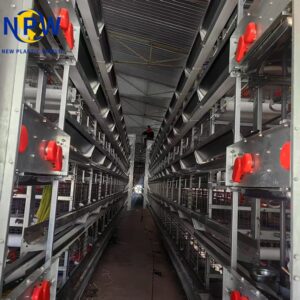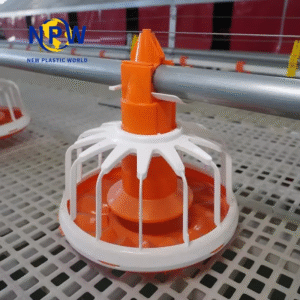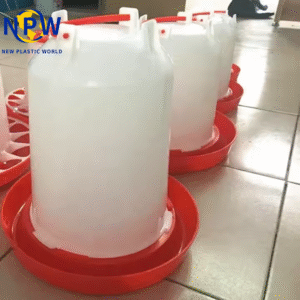Poultry farming is a vital commercial sector that contributes significantly to economic stability, particularly within the agricultural industry, where it stands as a prime example of vertical integration. The industry comprises two main segments: poultry meat production (from broilers) and egg production (from layers). This business is both praiseworthy and profitable, and the following insights aim to support its further development.
For successful poultry operations, efficient production is foundational—this is where Qingdao NPW Plastic Co., Ltd. plays a key role. As a provider of high-quality plastic poultry equipment, the company supports farmers in optimizing their production processes, laying a solid foundation for effective marketing.
Marketing refers to the activities involved in buying and selling goods in a market, with the goal of profitably meeting consumers’ needs. It encompasses processes such as selling, advertising, and delivering products to customers, while also building connections between producers and society. Businesses attract audiences through strategies like newspaper ads, celebrity endorsements, slogans, and media campaigns. For instance, when a company launches a new food product, a mutual dependency forms: consumers rely on the company for the product, and the company relies on consumers to sustain sales.
Effective marketing strategies for poultry products typically involve the following channels:
- Farmer to Trader: Products are sold directly at local markets or the farm gate.
- Farmer to Retailer: Products are supplied to supermarkets, restaurants, and other retail establishments.
- Farmer to Leading Farmer: Larger-volume orders are fulfilled by selling to a leading farmer who caters to bulk demand.
- Farmer to Co-operatives: Farmers aggregate their poultry products and sell them to packers, who then supply co-operatives.
- Direct Agreements with Farmers: Buyers guarantee purchases from farmers, ensuring market stability.
Poultry farming is invaluable to society, contributing to food security, economic growth, and employment. Its significance includes:
-
Food Security: Poultry meat and eggs are rich in protein, vitamins, and minerals, offering accessible nutrition. They are easy to prepare and affordable, supporting public health.
-
Livelihoods: The poultry sector provides income opportunities, especially for low-income groups and rural women, who can engage in various roles within the value chain.
-
Industrial Applications:
- Eggs: Spoiled eggs are used in fertilizers, animal feed, and vaccine production.
- Egg Yolk: Utilized in bakery mixes, soaps, shampoos, and paints.
- Feathers: Processed into animal feed, pillows, cushions, dusters, and insulation materials.
- Eggshells: Converted into mineral-rich fertilizers, decorative items, mosaic art, and more.
To maximize these benefits, efficient production is critical.
Qingdao NPW Plastic Co., Ltd. supports this by providing durable plastic equipment—
such as cages,
feeders, and
waterers—that enhance operational efficiency, directly contributing to the quality and quantity of poultry products.
- Income Generation: Poultry farming and product sales offer a reliable income stream, with rural women often leveraging this to supplement household earnings.
- Employment Creation: The sector generates jobs in farming, marketing, transportation, and related industries (e.g., hawkers, feed suppliers). It plays a key role in poverty alleviation by utilizing rural labor, including women’s underused time through family-based farming.
Success in marketing requires three key steps:
- Research and Analysis: Identify existing markets, understand their needs, set reasonable prices, and address customer service expectations (e.g., product quality, delivery, and ready-to-cook options).
- Decision-Making: Based on research, decide on strategies to enter new markets.
- Implementation: Execute plans with honesty, ensuring products meet quantity, packaging, and pricing standards.
Key Marketing Strategies:
- Bypass Middlemen: Invest in direct retail outlets to increase profits and gain first-hand market insights.
- Leverage Online Platforms: Use social media and e-commerce to showcase products (with high-quality photos), accept orders, and expand reach.
- Partner with Restaurants and Hotels: Draft compelling proposals to become a trusted supplier for bulk orders.
- Hire Marketers: Employ professionals to manage online and offline campaigns, building your brand’s reputation.
- Offer Attractive Packages and Delivery: Provide affordable deals and free home delivery—critical for new businesses to build trust and retain customers.
- Adopt Efficient Equipment: Use automated systems (e.g., H-type automated battery cage systems from Qingdao NPW Plastic Co., Ltd.) to enhance productivity and product quality, making your offerings more competitive in the market.

In summary, poultry farming is a boon to society, and with strategic marketing paired with reliable production tools—such as those offered by Qingdao NPW Plastic Co., Ltd.—it can thrive as a sustainable, profitable business.



